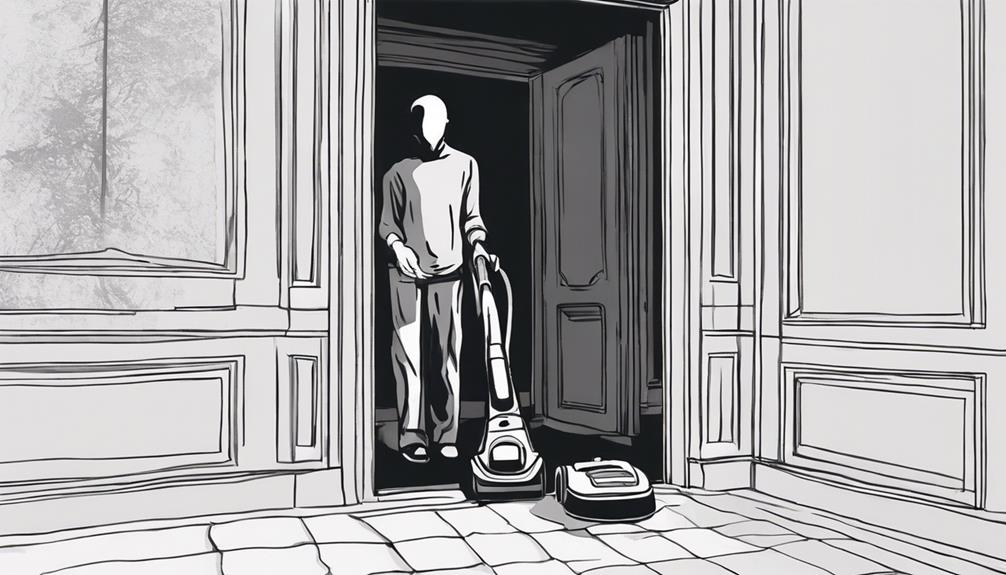Have you ever questioned your own sense of reality after talking to someone? Could you be falling for sneaky manipulation tactics from a secret narcissist? Discover the signs and protect yourself from harmful behaviors. Find out more about covert narcissists.
From subtle manipulations to emotional mind games, these individuals have mastered the art of control. Understanding these tactics is crucial for safeguarding our mental and emotional well-being.
Stay tuned to unravel the complexities of covert narcissism and empower yourself with the knowledge to navigate these challenging situations.
Key Takeaways
- Gaslighting and manipulation tactics distort reality and undermine victims' sense of self.
- Recognize victim playing to set boundaries and avoid emotional manipulation.
- Beware of seeking sympathy as a manipulative strategy to control interactions.
- Understanding relationship phases empowers individuals to identify and protect against covert narcissistic behaviors.
Gaslighting Techniques

Gaslighting Techniques are insidious manipulation tactics used by covert narcissists to distort reality and undermine their victims' sense of self and sanity. This form of emotional abuse aims to make the victim doubt their own perceptions, memories, and even sanity. It often starts subtly, with the narcissist making small comments or actions to sow seeds of confusion and self-doubt in the victim's mind. Over time, these tactics escalate, creating a pervasive atmosphere of psychological manipulation and control.
One common gaslighting technique is the denial of experiences or feelings. The narcissist might invalidate the victim's emotions, claiming they're overreacting or being too sensitive. By undermining the validity of the victim's feelings, the narcissist gains power and control over the victim's emotional state. Another technique involves the narcissist projecting their own behaviors onto the victim, making the victim feel like they're the ones at fault.
Understanding these gaslighting techniques is crucial in recognizing and breaking free from the cycle of manipulation imposed by covert narcissists. By shedding light on these insidious tactics, victims can begin to reclaim their sense of self and regain control over their own reality.
Victim Playing

Victim Playing is a common tactic employed by covert narcissists. It involves blaming others, seeking sympathy, and manipulating emotions to perpetuate their false narrative of victimhood. By shifting responsibility onto others and playing the victim, they aim to garner sympathy and deflect accountability for their actions.
This manipulative behavior can be emotionally draining and confusing for those on the receiving end. It is crucial to recognize and set boundaries against such tactics.
Blaming Others
When individuals engage in blaming others, they often shift responsibility for their actions onto someone else, portraying themselves as victims in the process. This tactic allows covert narcissists to avoid accountability and manipulate situations to their advantage.
By blaming others, they create a facade of innocence and victimhood, which can be emotionally draining for those around them. This behavior can lead to confusion and conflict within relationships, as the focus shifts from addressing the narcissist's actions to defending oneself against false accusations.
Understanding this tactic is crucial in recognizing manipulative behaviors and setting healthy boundaries. Being aware of these dynamics can empower individuals to navigate relationships with covert narcissists more effectively and protect their well-being.
Seeking Sympathy
In the context of covert narcissist tactics, seeking sympathy through victim playing is a manipulative strategy used to garner compassion and attention while evading accountability for one's actions. This behavior involves portraying oneself as the victim in various situations, exaggerating hardships or misfortunes to elicit empathy from others.
By constantly seeking sympathy, covert narcissists manipulate emotions to maintain a favorable image and control interactions. They often downplay their role in conflicts or shift blame onto others, positioning themselves as innocent victims. Recognizing this tactic is crucial in setting boundaries and avoiding being emotionally manipulated.
Understanding the patterns of seeking sympathy can empower individuals to respond assertively and protect their emotional well-being from covert narcissistic behaviors.
Manipulating Emotions
Manipulating emotions through tactics like victim playing is a deceptive strategy employed by covert narcissists to control interactions and elicit empathy from others.
This manipulative behavior involves portraying oneself as the victim in various situations to gain sympathy, deflect accountability, and manipulate the emotions of those around them.
By painting themselves as innocent victims of circumstances or others' actions, covert narcissists seek to manipulate the emotions of their targets, garnering support and validation for their false narratives.
This tactic can be emotionally draining for those on the receiving end, as it often involves guilt-tripping, gaslighting, and emotional manipulation.
Being aware of these covert tactics is essential in safeguarding oneself from falling prey to the emotional manipulation of covert narcissists.
Love Bombing

Love Bombing is a common tactic used by covert narcissists. It involves excessive flattery manipulation aimed at creating emotional dependency. This strategy often includes rapidly escalating the intensity of a relationship to secure control and admiration.
Excessive Flattery Manipulation
Engaging in excessive flattery as a manipulative tactic, individuals exhibiting covert narcissistic behavior often employ love bombing to swiftly gain trust and emotional access. Love bombing can involve showering someone with compliments, gifts, and attention to create a sense of euphoria and dependency. This tactic aims to establish control and manipulate emotions, leading the target to feel obligated to reciprocate the same level of affection.
- Overwhelming Attention: Constant messaging, calls, and surprises can create a sense of being the center of someone's world.
- Idealization: The narcissist may paint an idealized picture of the relationship, making the target feel special and perfect.
- Isolation: By isolating the target from others, the narcissist increases dependency and control over the individual.
Rapid Relationship Escalation
Upon intensifying their tactics, covert narcissists swiftly escalate relationships through a technique known as love bombing. This involves overwhelming the target with affection, attention, and grand gestures in a short period, creating a sense of euphoria and attachment. Love bombing aims to establish control and emotional manipulation over their targets.
This rapid relationship escalation is designed to hook the target emotionally, making it harder for them to see the narcissist's true intentions. The intense focus and adoration can lead the target to feel special and deeply connected, fostering dependence on the narcissist for validation and happiness.
Emotional Dependency Creation
To establish emotional dependency, covert narcissists employ a strategic technique known as love bombing. This involves overwhelming their targets with affection and attention in a short period to foster reliance and control.
- Excessive Flattery: By excessively praising and complimenting the target, the covert narcissist aims to create a sense of validation and self-worth in the individual.
- Intense Attention: Through constant communication and spending significant amounts of time with the target, the narcissist seeks to monopolize their attention and create a sense of exclusivity.
- Quick Commitment: Pushing for a rapid commitment or declaration of love can lead the target to feel deeply connected and obligated to reciprocate these feelings.
Triangulation

Triangulation is a manipulative tactic often used by covert narcissists to create conflict or jealousy within relationships by involving a third party. This strategy can be subtle, where the narcissist may compare you to others or speak highly of someone else to incite feelings of insecurity or competition. By introducing a third person into the dynamic, the covert narcissist aims to destabilize your sense of security and control in the relationship.
In these situations, it's essential to recognize the manipulation at play. The narcissist may use triangulation to maintain power and control over you, making you feel inadequate or unworthy. Understanding this tactic can help you set boundaries and protect your emotional well-being.
If you find yourself in a triangulation scenario, it's crucial to communicate openly with the narcissist and assert your feelings. Seeking support from a therapist or counselor can also assist you in navigating these complex dynamics and developing healthy coping mechanisms. Remember, you deserve to be in relationships that are built on trust, respect, and mutual understanding.
Hoovering

Moving on from the manipulative tactic of triangulation, another insidious behavior often employed by covert narcissists is known as hoovering. Hoovering is a manipulative technique used by narcissists to suck their victims back into a relationship or interaction after they've tried to distance themselves.
Here are three key aspects of hoovering:
- Love-Bombing: One common hoovering tactic is to shower the victim with excessive affection, praise, and attention. This sudden outpouring of love can be overwhelming and make the victim question their decision to create distance.
- False Promises: Narcissists engaging in hoovering often make empty promises of change or improvement. They may claim to seek therapy, work on themselves, or rectify past wrongs, only to revert to their harmful behaviors once the victim is back under their influence.
- Guilt Tripping: Another aspect of hoovering involves guilt tripping the victim. Narcissists may play on the victim's emotions, making them feel responsible for the narcissist's well-being or happiness, thereby manipulating them into rekindling the relationship.
Understanding these hoovering tactics can help individuals recognize and resist the manipulative behaviors of covert narcissists.
Silent Treatment

The Silent Treatment, a common tactic employed by covert narcissists, involves a deliberate and prolonged period of ignoring or refusing to engage with their victim as a form of manipulation and control. This form of emotional abuse can have a profound impact on the victim's mental well-being and self-esteem. The silent treatment is often used by narcissists to punish their victims, instill fear, and exert power over them. By withholding communication and emotional support, the narcissist aims to destabilize the victim and make them feel unworthy or insignificant.
During this period of silence, the victim may feel confused, anxious, and desperate for any form of acknowledgment or validation from the narcissist. The lack of communication can lead to a sense of isolation and rejection, leaving the victim vulnerable to further manipulation by the narcissist. It's essential for individuals experiencing the silent treatment to seek support from trusted friends, family members, or mental health professionals to navigate through this challenging situation and regain their sense of self-worth.
Smear Campaigns

Smear campaigns, a hallmark of covert narcissists, involve deceptive manipulation tactics aimed at damaging a person's reputation covertly.
These individuals strategically plant seeds of doubt and misinformation to undermine the credibility and character of their targets.
Understanding the insidious nature of smear campaigns is crucial in recognizing and protecting oneself from the harmful effects of covert narcissistic behavior.
Deceptive Manipulation Tactics
In covert narcissistic relationships, deceptive manipulation tactics, such as orchestrating smear campaigns, are often employed to discredit and undermine the target's reputation. These smear campaigns can be devastating and challenging to combat, leaving the victim feeling isolated and powerless.
- Covert Nature: Smear campaigns are usually carried out subtly, making it difficult for others to discern the truth and the manipulative tactics at play.
- Targeted Damage: The aim of a smear campaign is to tarnish the target's reputation, causing them emotional distress and potentially harming their relationships and opportunities.
- Strategic Timing: Narcissists often strategically time their smear campaigns to coincide with moments when the target is vulnerable or seeking support, intensifying the impact of the manipulation.
Damaging Reputation Covertly
Employing covert tactics to damage reputations, individuals with narcissistic traits strategically orchestrate smear campaigns to undermine their targets' credibility and social standing.
These campaigns are carefully planned and executed to tarnish the reputation of the victim subtly. Covert narcissists often use manipulation and deceit to turn others against their targets, spreading false rumors or misinformation to sow doubt and distrust.
By covertly damaging the reputation of their victims, narcissists aim to isolate them socially and emotionally, making it easier for the narcissist to maintain control and power. Understanding these tactics can help individuals identify and protect themselves from falling victim to smear campaigns orchestrated by covert narcissists.
It's essential to be vigilant and seek support from trusted allies to combat these damaging behaviors effectively.
Boundary Violations

When dealing with covert narcissists, it's crucial to recognize and address the insidious nature of their boundary violations. These individuals often push limits and overstep personal boundaries, creating discomfort and unease in their relationships. Understanding the tactics they use can help protect oneself from manipulation and emotional harm.
- Gaslighting: Covert narcissists may deny or distort reality to make others doubt their own perceptions and beliefs, eroding their sense of self and autonomy.
- Emotional Manipulation: They exploit emotions to control situations and people, often using guilt, pity, or fear to manipulate others into compliance.
- Isolation: By isolating individuals from their support networks, covert narcissists maintain power and control over their victims, making them more vulnerable to manipulation.
Recognizing these boundary violations is the first step in setting firm boundaries and protecting oneself from the harmful effects of covert narcissistic behavior. It's essential to prioritize self-care and seek support when dealing with individuals who consistently disregard personal boundaries.
Projection

Recognizing projection is essential when navigating interactions with covert narcissists, as it sheds light on their tendency to attribute their own negative traits or actions onto others. This defense mechanism allows them to avoid taking responsibility for their behavior by projecting it onto someone else. By understanding projection, individuals can better grasp why a covert narcissist may accuse others of qualities or actions that they themselves possess but are unwilling to acknowledge.
Projection often manifests in subtle ways, such as when a covert narcissist accuses someone of being manipulative when, in fact, they're the ones manipulating situations to suit their needs. This tactic can be confusing and disorienting for those on the receiving end, as they may start questioning their own behavior or character due to the projections being cast upon them.
It is crucial to remain grounded and self-aware when faced with projection from a covert narcissist. By recognizing this tactic for what it is, individuals can protect their self-esteem and maintain clarity in their interactions with manipulative individuals.
Discard and Devalue

Understanding the covert narcissist's tactic of 'Discard and Devalue' is crucial in unraveling the manipulative behavior they employ in relationships. This insidious strategy involves the narcissist gradually diminishing the value of their partner, ultimately leading to emotional devastation. Here are three key aspects to consider when dealing with this harmful behavior:
- Idealization Phase: Initially, the narcissist may put their partner on a pedestal, showering them with affection and admiration. This phase can make the partner feel special and deeply connected to the narcissist.
- Devaluation Phase: As the relationship progresses, the narcissist starts to criticize, belittle, and undermine their partner. This can be subtle at first, gradually escalating to overt forms of emotional abuse.
- Discard Phase: Finally, the narcissist may abruptly end the relationship, showing a complete lack of empathy or remorse. This sudden discard leaves the partner confused, hurt, and questioning their self-worth.
Recognizing these stages can help individuals identify and protect themselves from the damaging effects of a covert narcissist's 'Discard and Devalue' tactics.
Frequently Asked Questions
How Can Someone Identify if They Are Being Targeted by a Covert Narcissist's Smear Campaign?
When targeted by a covert narcissist's smear campaign, signs may include sudden negative rumors, isolation from social circles, or unexplained hostility from others.
To identify this, observe patterns of misinformation, assess changes in relationships, and trust your intuition.
Seeking support from trusted individuals and maintaining clear communication can help in navigating these situations.
What Are Some Red Flags to Look Out for in a Relationship That May Indicate Covert Narcissistic Behavior, Aside From Gaslighting Techniques and Victim Playing?
Ever noticed a pattern of entitlement and lack of empathy in someone close to you? These could be red flags indicating covert narcissistic behavior.
Watch for manipulation through subtle guilt trips or constant need for admiration. If you find yourself always walking on eggshells or feeling drained after interactions, it might be time to reassess the dynamics of the relationship.
Trust your instincts and seek support if needed.
How Can One Effectively Establish and Maintain Boundaries With a Covert Narcissist Who Engages in Boundary Violations?
When dealing with boundary violations from a covert narcissist, it's essential to establish firm boundaries and consistently reinforce them.
We should clearly communicate our limits, enforce consequences when boundaries are crossed, and seek support from trusted individuals.
What Are Some Strategies for Protecting Oneself From Being Emotionally Manipulated by a Covert Narcissist's Love Bombing Tactics?
When dealing with love bombing tactics from a covert narcissist, we need to be vigilant in recognizing the signs of manipulation. Setting clear boundaries and maintaining a healthy sense of self-worth is key.
By trusting our instincts and not rushing into deep emotional commitments too quickly, we can protect ourselves from being emotionally manipulated.
It's important to prioritize our own well-being and not be swayed by superficial displays of affection.
Is There a Way to Differentiate Between Genuine Apologies and Manipulative Tactics Used by a Covert Narcissist During the Discard and Devalue Phase of a Relationship?
During the discard and devalue phase, we must carefully analyze the actions of the individual in question. Genuine apologies typically involve taking responsibility, expressing remorse, and making amends.
On the other hand, manipulative tactics from a covert narcissist may involve deflecting blame, minimizing the harm caused, or using apologies as a tool for further manipulation. By observing patterns of behavior and considering the sincerity of the apology, we can better differentiate between the two.
What Are the Common Tactics Used by Female Covert Narcissists in Relationships?
Female covert narcissist cheating patterns can include gaslighting, manipulation, and emotional abuse to maintain control. They may exhibit a lack of empathy, constant need for validation, and charming personality to mask their true intentions. These tactics can make it difficult to detect their infidelity and toxic behavior in relationships.
Conclusion
In conclusion, understanding the tactics of covert narcissists is crucial for protecting ourselves from their manipulative behaviors.
By recognizing gaslighting techniques, victim playing, love bombing, and other tactics, we can empower ourselves to set boundaries and not fall prey to their manipulation.
Stay vigilant and educate yourself on these tactics to safeguard your mental and emotional well-being. Remember, knowledge is power in dealing with covert narcissists.









